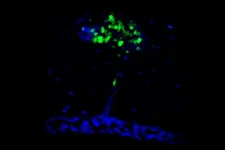INFORMATION:
Evidence for a previously unknown extinction event that decimated ocean shark species
2021-06-03
(Press-News.org) Nineteen million years ago, sharks nearly disappeared from Earth's oceans, according to a new study, which provides evidence for a previously unknown mass ocean extinction event. Sharks as a species never recovered from this, the study's authors say; their diversity today represents only a fraction of what it once was, the data suggest. Much of what is known about ancient ocean ecosystems is derived from rock and fossil records, which are generally limited to shallow-water deposits and provide only a small glimpse into the ocean-wide history of marine species. Here, using a different dataset - small fossils in global deep-sea sediment cores - Elizabeth Sibert and Leah Rubin provide a new view into changes in the abundance and diversity of one of the ocean's greatest predators. Using microfossils in the sediment cores called ichthyoliths - scales and teeth shed from sharks and other bony fishes that naturally accumulate on the seafloor - Seibert and Rubin constructed a record of shark diversity and abundance spanning nearly the last 40 million years. According to the findings, sharks all but vanished from the record during the early Miocene roughly 19 million years ago, declining in abundance by more than 90% and in morphological diversity by more than 70%. This puzzling extinction event appears to have occurred independently of any known global climate event or terrestrial mass extinction. While the drivers remain unknown, the authors suggest that this event fundamentally altered pelagic predator ecology and subsequently set the stage for the large, migratory shark lineages that now dominate Earth's oceans. "Despite recent improvements in conservation actions, few countries impose restrictions that target oceanic sharks," write Catalina Pimiento and Nicholas Pyenson in a related Perspective. According to Pimiento and Pyenson, the parallels between the early Miocene extinction event and the declines driven by human pressures today bear a striking similarity. "Pelagic shark communities never recovered from a mysterious extinction event 19 million years ago; the ecological fate of what remains is now in our hands," they write.
ELSE PRESS RELEASES FROM THIS DATE:
Synthetic E. coli reprogramed with multiple new genetic building blocks exhibit viral resistance
2021-06-03
By engineering the genetic code of a synthetic strain of E. coli to include several nonstandard amino acids, researchers rendered the synthetic bacterium virtually invincible to viral infection. Their work is some of the first to design proteins using not one but multiple non-canonical amino acids. "The ability to generate designer proteins using multiple non-natural building blocks will unlock countless applications, from the development of new classes of biotherapeutics to biomaterials with innovative properties," write Delila Jewel and Abhishek Chatterjee in a related Perspective. In nature, biological systems use 64 codons - a unique triplet of nucleotides - to encode ...
Mixed farming methods could reduce US emissions and increase productivity
2021-06-03
Small-scale mixed-use agriculture that avoids synthetic fertilizers in favor of manure could eliminate agricultural greenhouse gas emissions if established across the United States' 100 million hectares of lush high quality cropland, according to a study by Gidon Eshel, publishing 3rd June 2021 in the open-access journal PLOS Biology. The minor catch: beef consumption would need to decrease, but by only 20%.
Beef is the most resource-intensive food item that we regularly put into our shopping carts -- for every gram of protein, beef uses 7 times more cropland and 20 times as much water and emits 11 times the greenhouse gases. At the same time, cattle manure is a valuable source of natural fertilizer. Nitrogen-sparing agriculture avoids external inputs of nitrogen, such as synthetic ...
Expression of 'fat' genes correlate with metabolic, behavioral changes linked to obesity
2021-06-03
A collection of genetic variants influences the expression of obesity-associated genes in both the brain and fat tissue, according to a new study from researchers at the University of Chicago. The research team found that changes in the expression of the obesity-associated genes correlated with both metabolic and behavioral changes, suggesting that these variants produce combinatorial effects that increase the risk of obesity. The results, which scientists hope will lead to better understanding of the mechanisms that make some people more susceptible to obesity, were published June 4 in END ...
Studies reveal skull as unexpected source of brain immunity
2021-06-03
The immune system is the brain's best frenemy. It protects the brain from infection and helps injured tissues heal, but it also causes autoimmune diseases and creates inflammation that drives neurodegeneration.
Two new studies in mice suggest that the double-edged nature of the relationship between the immune system and the brain may come down to the origins of the immune cells that patrol the meninges, the tissues that surround the brain and spinal cord. In complementary studies published June 3 in the journal Science, two teams of researchers at Washington University School of Medicine in St. Louis unexpectedly found that many of the immune cells in the meninges come from bone marrow in the skull and migrate to the brain through special channels without passing through ...
Antarctica wasn't quite as cold during the last ice age as previously thought
2021-06-03
CORVALLIS, Ore. - A study of two methods for reconstructing ancient temperatures has given climate researchers a better understanding of just how cold it was in Antarctica during the last ice age around 20,000 years ago.
Antarctica, the coldest place on Earth today, was even colder during the last ice age. For decades, the leading science suggested ice age temperatures in Antarctica were on average about 9 degrees Celsius cooler than at present.
An international team of scientists, led by Oregon State University's Christo Buizert, has found that while parts of Antarctica were as cold as 10 degrees below current temperatures, temperatures over central East Antarctica were only 4 to 5 degrees ...
NIH researchers identify potential new antiviral drug for COVID-19
2021-06-03
The experimental drug TEMPOL may be a promising oral antiviral treatment for COVID-19, suggests a study of cell cultures by researchers at the National Institutes of Health. TEMPOL can limit SARS-CoV-2 infection by impairing the activity of a viral enzyme called RNA replicase. The work was led by researchers at NIH's Eunice Kennedy Shriver National Institute of Child Health and Human Development (NICHD). The study appears in Science.
"We urgently need additional effective, accessible treatments for COVID-19," said Diana W. Bianchi, M.D., NICHD Director. "An oral drug that prevents SARS-CoV-2 from replicating would be an important tool for reducing the severity of the disease."
The ...
New method accurately reflects hotspots in epidemic
2021-06-03
A new method to monitor epidemics like COVID-19 gives an accurate real-time estimate of the growth rate of an epidemic by carefully evaluating the relationship between the amount of viruses in infected people's bodies, called the viral load, and how fast the number of cases is increasing or decreasing.
"This new method, which effectively links what we know about how the virus grows within the body to the dynamics of how the virus spreads across a population, provides a brand new metric that public health officials, policy makers, and epidemiologists will be able to use to get up-to-date real-time information on the epidemic," said Michael Mina, assistant professor of epidemiology at Harvard T.H. Chan School of Public Health ...
Study on heavy drinking in young adults and the psychological impacts of COVID-19
2021-06-03
HAMILTON, ON (June 3, 2021) - A novel longitudinal study on heavy drinking in young adults and the psychological impacts of COVID-19 has revealed some unexpected findings that challenge preconceived notions regarding pandemic-related alcohol use.
In a sample of nearly 500 young adults ranging in age from 18 to 25, researchers saw a reduction in problematic drinking and alcohol consequences during the initial phase of the pandemic for both men and women. This is in contrast to many anecdotal reports of increased drinking and increased household spending on alcohol during that time period.
More startling, however, were the additional findings that showed increased rates of depression and anxiety symptoms among young women - increases that ...
Immune therapy after surgery lowers relapse risk in patients with high-risk melanoma
2021-06-03
PORTLAND, OR - Patients with high-risk melanoma who had a course of pembrolizumab after their surgery had a longer time before their disease recurred than patients who got either ipilimumab or high-dose interferon after surgery. These findings of a large SWOG Cancer Research Network clinical trial, S1404, will be presented at the ASCO annual meeting June 6, 2021.
Researchers also measured overall survival and found no statistically significant difference in overall survival rates between the two groups of patients three and one-half years after the last patient enrolled to the trial. They did find, however, that patients taking pembrolizumab had fewer serious side effects than those treated with either high-dose interferon or ipilimumab.
The S1404 trial ...
New technology 'listens' for endangered right whales
2021-06-03
One of the world's most endangered whale species could have added protection from threats posed by human marine activity, through technology developed by the University of East Anglia (UEA).
In partnership with the Scottish Association for Marine Science (SAMS) and the marine survey company Gardline Geosurvey Limited, UEA researchers have developed machine learning techniques that can be used to detect the presence of North Atlantic right whales by listening for the sounds they make underwater.
Detecting the animals' presence before they reach close proximity ...



